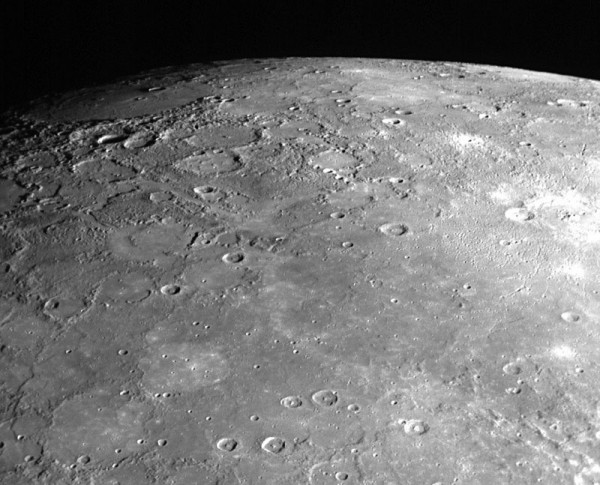Just a few minutes ago, researchers with NASA's MESSENGER mission announced the publication of data that strongly suggests the poles of Mercury contain significant quantities of frozen water.
On the one hand, this is not exactly new news. The possibility of water on Mercury has been a topic of research for something like 20 years. And scientific discoveries tend to move in little mincing steps, not giant leaps, so there have been lots of previous announcements about evidence supporting the hypothesis of water of Mercury — including very similar announcements from the MESSENGER team in December 2011 and March 2012. Your life will not change in any significant way because there is frozen water on Mercury. You probably won't even make a note to tell your children where you were the day NASA announced that ice most likely existed there.
But that doesn't mean this news isn't damned exciting. And it doesn't mean that the scientists involved shouldn't be giddy about it. We are, after all, talking about a mission that sent a spacecraft into orbit around another planet and has quite likely found frozen water sitting on a landscape that is hot enough to melt lead. What's more, they think that ice is covered in places by a thin layer of some coal or tar-like organic material. That is huge news. It's going to change textbooks. And because the scientists think both the ice and the organic material got to Mercury via collisions with asteroids and comets, it's going to be an important part of our ongoing efforts to understand how life begins on planets like Earth.
All of this makes for a really nice, topical lead-in to an essay Robert Gonzalez published on iO9 today. It's totally reasonable to be frustrated by the recent whiplash of hearing that Curiosity discovered something "Earth-shattering" on Mars, only to have that announcement quickly revised to something "interesting" and/or "not insignificant". But, Gonzalez argues, it's also reasonable for scientists to look at something that is merely not insignificant from the public perspective and see it, from their own perspective, as groundbreaking. In fact, he says, we want more scientists who get excited about their work, not fewer.
Because here's the thing: I think it's a good thing when scientists are outwardly excited about their research. When someone like Grotzinger overstates the significance of a discovery, it reminds us that scientists are humans who are wholly invested in their work, and it makes their pursuits more relatable. I believe that the tendency among scientists to present themselves as dispassionate, robotlike, and wholly objective is boring and dishonest.
Granted, there are different ways to "expose one's humanity," and some are vastly preferable to others. Do we want researchers to engage in wholesale scientific fraud? Obviously not. But could scientists stand to be, for example, more outwardly enthusiastic about their work? Absolutely. Scientists, even the pompous ones, tend to undersell their findings, eschew "flowery" language, and feign complete objectivity — all under the banner of "good science."
But sometimes this approach is bullshit.
Cutting through the bullshit means allowing scientists to be people. More importantly, it means allowing them to not just tolerate that process of inch-by-inch discovery … but actively geek out about it.
Gonzalez isn't trying to say that the researchers at the Jet Propulsion Laboratory couldn't have been more clear with reporters. From what we know about this misunderstanding it's pretty clear that mistakes happened on both sides. He's also not supporting intentional over-hype of results.
Instead, he thinks (and I agree) that scientists shouldn't pretend they're emotionless about the stuff they love. In fact, when combined with careful communication, that emotion can actually be an important part of helping the public understand science. When you're enthusiastic about your work, you spread that enthusiasm. In my experience, the scientists who the best job of making their work clear to lay people are the ones who are obviously hyped up about what they're doing — even if what they're doing isn't ever going to be front-page, above-the-fold news.
Besides, I don't only want to know what history books will think is important. I want to know what science thinks is important. And listening to scientists is the best way to find that out.
Read Robert Gonzalez's essay on iO9
Read more about today's news from the MESSENGER mission to Mercury



